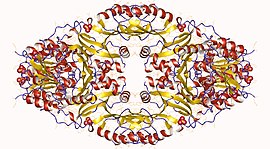ホモセリンデヒドロゲナーゼ
ホモセリンデヒドロゲナーゼ(homoserine dehydrogenase)は、次の化学反応を触媒する酵素である。
- L-ホモセリン+ NAD(P)+ L-アスパラギン酸-4-セミアルデヒド+ NAD(P)H + H+
の酵素反応を触媒する酵素である。この反応ではL-ホモセリンとNAD+(またはNADP+)の2種の基質からL-アスパラギン酸-4-セミアルデヒドとNADH(またはNADPH)、H+の3種の生成物が生じる。
酸化還元酵素に属し、L-ホモセリンはその電子供与体、NAD+(またはNADP+)は電子受容体としてはたらく。この酵素は、グリシン・セリン・トレオニン・システイン・メチオニンの代謝および、リシンの生合成に関与している。
系統名ではL-homoserine:NAD(P)+ oxidoreductase。
参考文献
編集- BLACK S, WRIGHT NG (1955). “Homoserine dehydrogenase”. J. Biol. Chem. 213: 51–60. PMID 14353905.
- Starnes WL, Munk P, Maul SB, Cunningham GN, Cox DJ, Shive W (1972). “Threonine-sensitive aspartokinase-homoserine dehydrogenase complex, amino acid composition, molecular weight, and subunit composition of the complex”. Biochemistry. 11: 677–87. doi:10.1021/bi00755a003. PMID 4551091.
- Veron M, Falcoz-Kelly F, Cohen GN (1972). “The threonine-sensitive homoserine dehydrogenase and aspartokinase activities of Escherichia coli K12. The two catalytic activities are carried by two independent regions of the polypeptide chain”. Eur. J. Biochem. 28: 520–7. doi:10.1111/j.1432-1033.1972.tb01939.x. PMID 4562990.

